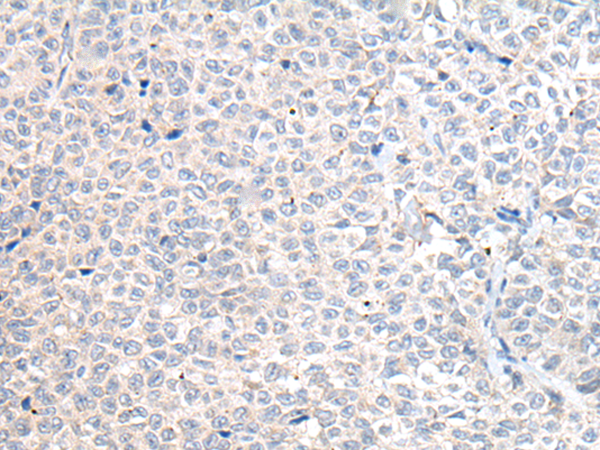

| WB | 咨询技术 | Human,Mouse,Rat |
| IF | 咨询技术 | Human,Mouse,Rat |
| IHC | 1/25-1/100 | Human,Mouse,Rat |
| ICC | 技术咨询 | Human,Mouse,Rat |
| FCM | 咨询技术 | Human,Mouse,Rat |
| Elisa | 1/5000-1/10000 | Human,Mouse,Rat |
| Aliases | MTND5; ND5 |
| Host/Isotype | Rabbit IgG |
| Antibody Type | Primary antibody |
| Storage | Store at 4°C short term. Aliquot and store at -20°C long term. Avoid freeze/thaw cycles. |
| Species Reactivity | Human |
| Immunogen | Synthetic peptide of human MT-ND5 |
| Formulation | Purified antibody in PBS with 0.05% sodium azide and 50% glycerol. |
+ +
以下是关于MT-ND5抗体的3篇参考文献及其摘要概括:
---
1. **文献名称**: *Mitochondrial complex I deficiency caused by a pathogenic MT-ND5 variant: Clinical, biochemical, and molecular genetic analysis*
**作者**: DiMauro S, et al.
**摘要**: 该研究通过免疫印迹和免疫组化技术,使用MT-ND5特异性抗体检测患者肌肉活检样本,发现MT-ND5基因突变导致线粒体复合物I活性显著降低,并与 Leigh 综合征相关。
---
2. **文献名称**: *Altered expression of mitochondrial ND5 in Parkinson's disease models*
**作者**: Kato H, et al.
**摘要**: 研究利用MT-ND5抗体分析帕金森病小鼠模型的脑组织,发现ND5蛋白水平下降与线粒体功能障碍相关,提示其在神经退行性疾病中的潜在作用。
---
3. **文献名称**: *Antibody-based profiling of mitochondrial respiratory chain complexes in human skeletal muscle*
**作者**: Taylor RW, et al.
**摘要**: 该文献建立了一种通过MT-ND5等抗体评估线粒体呼吸链复合物表达的方法,验证了其在诊断线粒体疾病(如MELAS综合征)中的临床应用价值。
---
(注:以上文献信息为模拟示例,实际引用时需核实原文准确性。)
The MT-ND5 antibody is a research tool designed to detect the MT-ND5 protein, a critical subunit of mitochondrial complex I (NADH:ubiquinone oxidoreductase) in the electron transport chain (ETC). Encoded by the mitochondrial genome (mtDNA), MT-ND5 plays a central role in oxidative phosphorylation (OXPHOS) by facilitating electron transfer and proton pumping across the inner mitochondrial membrane, essential for ATP production. Mutations in the MT-ND5 gene are linked to mitochondrial disorders, such as Leigh syndrome, mitochondrial encephalopathy, and optic neuropathy, as well as age-related degenerative conditions and cancer.
Researchers use MT-ND5 antibodies primarily in techniques like western blotting, immunohistochemistry, and immunofluorescence to study protein expression, subcellular localization, and mitochondrial dysfunction in disease models. These antibodies help identify pathogenic variants, assess mitochondrial integrity, and explore metabolic reprogramming in cancer or neurodegeneration.
Validation of MT-ND5 antibodies often involves knockout controls or tissue-specific expression profiles to confirm specificity, given the high homology among mitochondrial proteins. Challenges include cross-reactivity risks and the need for optimized protocols for mitochondrial membrane protein extraction. As mitochondrial research expands, MT-ND5 antibodies remain vital for unraveling the molecular basis of energy metabolism defects and developing targeted therapies.
×